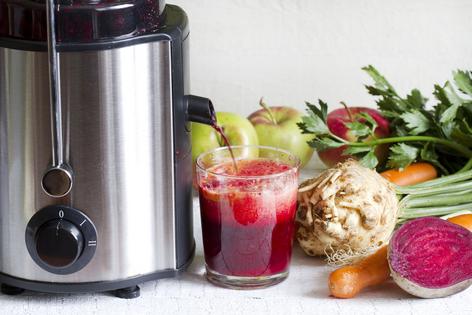Environmental Nutrition: The truth about juicing
The health claims about juicing seem too good to be true: lose weight, cleanse toxins from your body, cure or prevent illness. Unfortunately, science doesn't back up those claims. But that doesn't mean drinking a fresh glass of fruit-and-veggie juice is a bad idea.
Benefits of juicing
Fruits and vegetables are chock full of vitamins, minerals and phytochemicals, and study after study shows that people who eat more of them are likely to be healthier. It's recommended that we all try to eat at least two fruits and three to four servings of vegetables every day. If that goal is hard for you to reach, throwing a few servings into a juicer and drinking them can help you increase your intake of these important foods. Many people find juicing an easy, efficient and delicious way to insure they get enough fruits and veggies.
Pitfalls of juicing
As anyone who has ever used a juicer knows, the juice comes out one end, and a messy pulp comes out the other. That pulp is fiber, and fiber is good for us. It helps us eat less by making us feel full, removes cholesterol from the body, keeps us regular, feeds the beneficial bacteria in our gut, and it also may lower the risk of diverticulitis and colon cancer. Fiber also slows the release of sugars into the bloodstream. Although natural sugars don't cause the same health problems as added sugars, without the fiber to slow it down the natural sugars in juice enter the bloodstream more quickly than sugars in whole foods, which may be a less healthful outcome.
Cautions and tips
If you like to juice, include more vegetables, limit yourself to just one serving a day, and remember to eat whole fruits and veggies as well. Be sure to wash all produce thoroughly and drink the juice the day it's made: harmful bacteria can grow quickly in fresh squeezed juice, and the longer it sits, the more nutrients it will lose. And, if you're going to drink your veggies, reuse the pulp to get all the benefits fiber-filled produce has to offer.
(Environmental Nutrition is the award-winning independent newsletter written by nutrition experts dedicated to providing readers up-to-date, accurate information about health and nutrition in clear, concise English. For more information, visit www.environmentalnutrition.com.)







